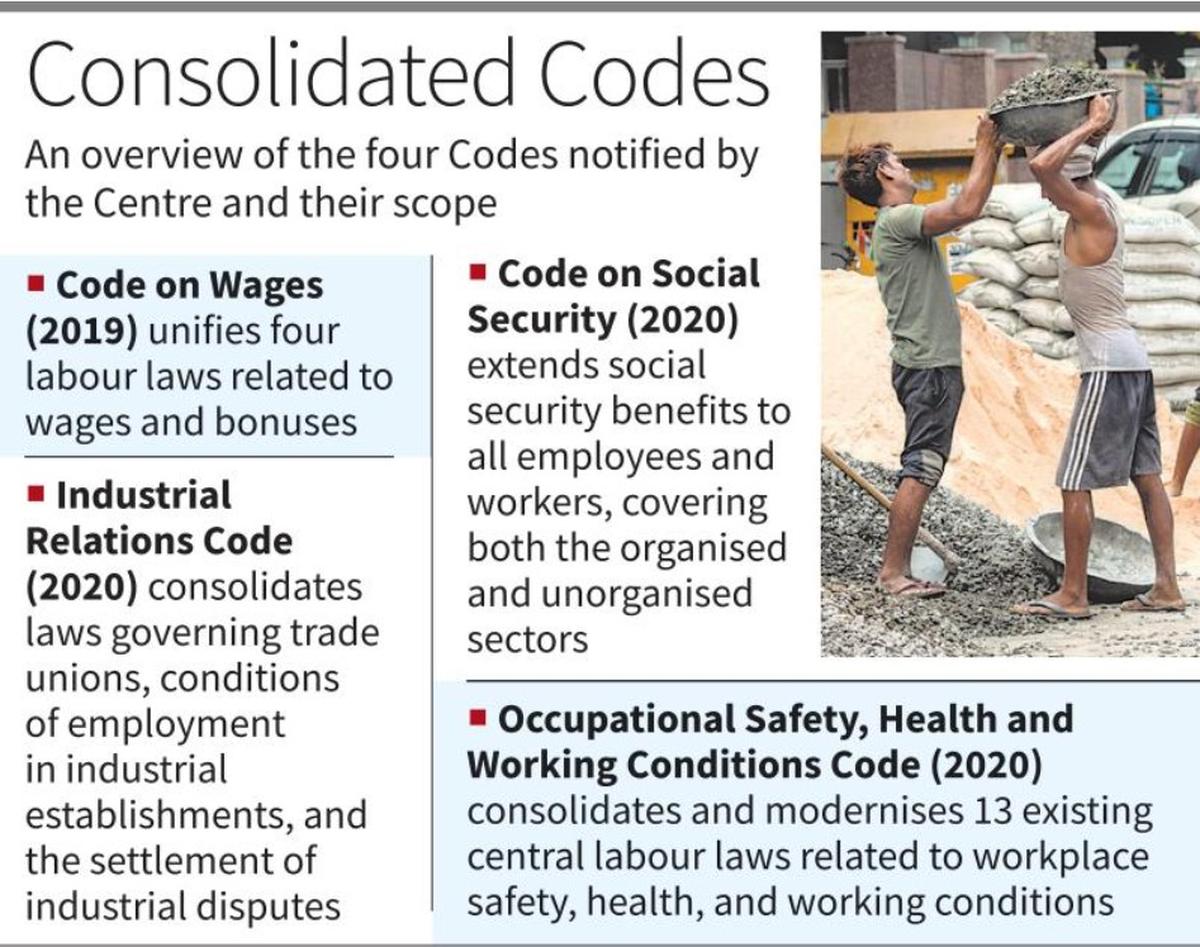The government on Friday (November 21, 2025) notified all four Labour Codes ushering in major reforms including extending universal social security coverage for gig workers, promising gender pay parity, expanded rights and safety for women workers, providing statutory backing for minimum wages, and introducing fixed term employment.
The four Labour Codes – Code on Wages (2019), Industrial Relations Code (2020), Code on Social Security (2020) and the Occupational Safety, Health and Working Conditions (OSHWC) Code (2020) – have been held back due to protests from trade unions, which continue. In a joint statement, 10 Central Trade Unions (CTUs) called the Codes an “anti-worker and pro-employer” reform.

The laws came into effect from Friday. These replaced 29 fragmented laws, many of which date back to pre-Independence and early post-Independence eras (1930s-1950s).

Prime Minister Narendra Modi described the new laws as “one of the most comprehensive and progressive labour-oriented reforms since Independence” which, he said, will serve as a strong foundation for universal social security, minimum and timely payment of wages, safe workplaces, and remunerative opportunities.
“It greatly empowers our workers. It also significantly simplifies compliance and promotes ‘Ease of Doing Business’,” he said in a post on X.
Union Labour Minister Mansukh Mandaviya said the Codes will formalise employment, strengthen worker protections, and make the labour ecosystem simpler, safer and globally aligned. He had been in regular touch with State governments, trade unions and employer bodies for the past three years. The Ministry had informed that almost all States had published draft rules for the Codes, and the Centre is hand-holding those States and Union Territories that were yet to frame the rules.
The reforms include expanded rights and safety for women, including night-shift work, free annual health check-ups for workers aged over 40 years, pan-India ESIC coverage including hazardous process units, and a single registration, licence and return system. Additional systemic reforms include a national floor wage, gender-neutral work policy, inspector-cum-facilitator model for supportive compliance, faster dispute resolution through two-member tribunals, and a National Occupational Safety, Health (OSH) Board to harmonise safety standards. The reforms are aimed at streamlining contractual workers with the provision of “fixed term employees” which entails all benefits equal to those of permanent workers, including leave, medical, and social security.

The Codes have defined gig work, platform work, and aggregators for the first time.
Aadhaar-linked Universal Account Number will make welfare benefits easy to access, fully portable, and available across States, regardless of migration. Plantation workers will be brought under the OSHWC Code and the Social Security Code.
The government will now initiate consultations to frame detailed rules and schemes.
On Thursday (November 20), the CTUs met Union Finance Minister Nirmala Sitharaman and urged her not to implement the Codes. On Friday, 10 unions sent a message that the notification of these codes, amidst deepening unemployment crisis and rising inflation is nothing short of “declaration of war” on the working masses.
“The Union government in cahoots with its capitalist cronies is attempting to take the country back to the exploitative era of master-servant relationship,” they said, adding that a series of protests will be launched on November 26 against the Codes. The CTUs had observed a one-day general strike on July 9.
The Bharatiya Mazdoor Sangh (BMS), which welcomed the implementation of the Codes, had been asking the government to remove ‘anti-worker’ provisions from the Occupational Safety Code and Industrial Relations Code through compulsory consultation with trade unions. The BMS was in support of the Code on Wages (2019) and the Code on Social Security (2020).
CII Director General Chandrajit Banerjee, meanwhile, hailed the reforms as a “historic milestone” for India’s labour landscape. “The Government’s implementation of four Labour Codes marks a transformative leap towards a modern and simplified and future ready labour ecosystem,” he said.
Published – November 21, 2025 03:42 pm IST
